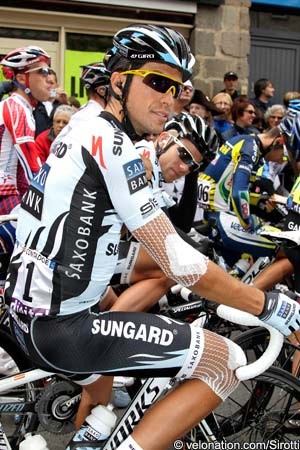Questions raised about how appeal was conducted
 Questions asked in recent days by Flavio Becca, one of RadioShack Nissan sponsors, about the Contador case have been followed by a report stating that the World Anti-Doping Agency had concerns about the actions of the panel conducing the CAS hearing in November.
Questions asked in recent days by Flavio Becca, one of RadioShack Nissan sponsors, about the Contador case have been followed by a report stating that the World Anti-Doping Agency had concerns about the actions of the panel conducing the CAS hearing in November.
According to AP, CAS judges blocked the testimony of one of WADA’s chief witnesses, anti-doping scientist Michael Ashenden, who it is believed was going to be asked if he felt Contador could have manipulated his blood during the 2010 Tour de France.
Ashenden is a member of the UCI’s bio passport panel, and is therefore charged with identifying riders who had erratic blood readings consistent with possible blood doping.
AP states that one theory is that Contador could have had two separate infusions around the second rest day of the Tour. The first would be a blood transfusion on July 20th, then a separate infusion of plasma the following day which would have served to dilute the blood and thus conceal signs of changes.
WADA’s proposed theory may have been that a surge in plasticizers could have been linked to the blood transfusion, while the Clenbuterol found in his system could have been introduced by the plasma infusion.
However lawyers for Contador objected and, after deliberation, the CAS panel chairman Efraim Barak reportedly ruled that WADA lawyers could not question Ashenden about the transfusion theory. They could, however, cross-examine an anti-doping consultant for Contador’s side, Paul Scott.
According to participants at the hearing, who told AP that they wished to remain anonymous, WADA lawyers were upset by the handling of the case and considered walking out. “’At that point, they seriously were on a knife edge,” said a witness.
The WADA team ultimately remained as part of the trial, but later submitted a written complaint that the CAS panel did not respect WADA’s right to be heard. It is understood that this complaint could enable WADA to appeal to the Swiss Federal Tribunal, Switzerland’s supreme court, over procedural issues.
Contador tested positive for Clenbuterol during the 2010 Tour de France and has been defending himself since then. He was cleared last February by the Spanish cycling federation RFEC amid claims of possible interference from the Spanish prime minister and others. WADA and the UCI subsequently appealed his appointment to CAS.
That was held in November, with a decision thought likely to come this month.
VeloNation has sought a response from WADA, the UCI, Ashenden and CAS about the hearing and possible dissatisfaction about how it was conducted. The first three have said that they are unable to comment on ongoing cases, while CAS is yet to respond.
Background of CAS panel chairman:
In recent days Becca – who backs the team featuring the rider who finished second to Contador in 2010, Andy Schleck – questioned the Saxo Bank SunGard team’s decision to hold a training camp in Israel after the hearing.
“When I saw that there’s an Israeli judge that’s on the commission being called up to decide, I think that’s a bad start,” Becca told Le Quotidien. “His team went to Israel for a training camp and had the added bonus of a reception by the government.”
The CAS panel comprised three arbitrators. Contador’s legal team selected the German Ullrich Haas, WADA and the UCI choose Quentin Byrne-Sutton of Switzerland and the chairman – who has the role of being fully neutral as he has the deciding vote – was chosen by CAS. This was Efraim Barak, a lawyer from Israel.
CAS spokesman Matthieu Reeb rejected any suggestions of bias. “Normally I would not comment on such allegations. But it’s so sad that there are accusations against our authority, credibility, and one of our arbitration panel, so I will note that it is untrue speculation without any basis in reality,” he told sporten.dk yesterday.
“He is not for sale. We are quite confident about his independence, and if you review his resume, you will also notice that he neither has any connection to the world of cycling or the Israeli government.”
VeloNation notes that Barak does however have some connections to Spain. Born in Buenes Aires in Argentina and speaking fluent Spanish, his own LinkedIn profile states that in 1992 he became a member of the Rex Sport Associacion de Asesores del Deporte, a Spanish legal entity with a main branch in Barcelona.
He is also professor at the Master degree program in International Sport Law at Madrid’s Instituto de Estudios Bursátiles and Instituto Superior de Derecho y Economía.
AP also points out that at least twice in two months preceding the hearing, Barak visited Spain to speak on CAS issues at seminars in Madrid. One was organized by the Spanish Football Federation. The other, on Nov. 8, was at Spain’s National Sports Agency.
However it noted that lawyers for Contador also spoke at those conferences; WADA attended the first, while representatives of both WADA and the UCI spoke at the Nov. 8 seminar.
WADA lawyers were reportedly uneasy about Barak’s appointment, but didn’t formally challenge it prior to the CAS hearing.
A final CAS ruling could come prior to the end of this month. Contador’s lawyers have already indicated that they are likely to appeal if he is sanctioned.
Today’s news suggests that WADA could also go further if they are unhappy with the outcome, thus extending a case which has already lasted well over a year.